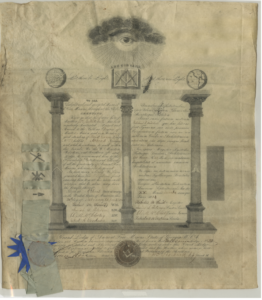Global Brotherhood: Freemasonry in Georgia, Athens, and at the University of Georgia
Project Director: Alisa Luxenberg (Lamar Dodd School of Art)
This Andrew W. Mellon Foundation grant-funded project is part of the Global Studies of the American South research category in the Willson Center’s expanded Global Georgia Initiative.

This project aims to represent and interpret the historical presence, activities, and significance of Freemasonry and fraternal societies in the colony and state of Georgia, with a certain focus on Athens and the University of Georgia. While historians may acknowledge that one of the founders and the first governor of the British colony of Georgia, General James Edward Oglethorpe, was a Freemason, few scholars have evaluated the wider impact of Freemasonry or even the lodge he helped establish, Solomon’s Lodge No. 1 of Savannah, one of the first chartered lodges in the North American colonies. In fact, speculative or modern Freemasonry was then a relatively new social organization, instituted in England by the early 1720s, that sought to form a universal brotherhood of virtuous men, regardless of social class, profession, or religion. Meeting in local lodges to socialize and to improve themselves and their communities through enlightened study and conduct, fraternal assistance, and charitable activity, Freemasons practiced radical principles of self-government, equality, and tolerance that have been regarded as rehearsals for American democracy and French republicanism. Often operating in secret to avoid persecution, Freemasonry and other fraternal societies communicated through symbols, signs, and emblems that were drawn from a wide range of historical traditions and cultural sources. Sensitive to the multiple and shifting meanings of visual forms, art historical inquiry can contribute particular methods and expertise to identifying and interpreting masonic or fraternal references, but my research will necessarily be interdisciplinary, intersecting with such fields as history, religion, political science, and sociology, and issues of gender and race.
My project aligns with the Mellon-supported research initiative, “Global Studies of the American South,” in that Freemasonry quickly became an international organization, establishing or inspiring lodges in various political states across the world, thereby providing welcome and support to traveling or emigrating Masons as they tried to establish themselves in a new community and, sometimes, a different culture. The international body of colonists that came to British Georgia were recruited to this new association, and the University of Georgia, the first state-chartered institution of higher learning in the U.S.A., was largely conceived and established by Masons. The busy port of Savannah served as a conduit for the colonists and other immigrants and visitors, and seems likely to have connected Georgian and international Freemasonry. To share this research with a broader public, I will curate an exhibition centered on the varied objects and documents of Freemasonry and fraternalism that belong to UGA’s Special Collections Libraries, projected for the year 2023. A new course that I will teach in Spring 2020, thanks to a 2019 Special Collections Libraries Faculty Teaching Fellowship, will provide students with opportunities to conduct original research on the SCL objects or field research on former masonic sites in Athens, and to help create a related DIGI website.
